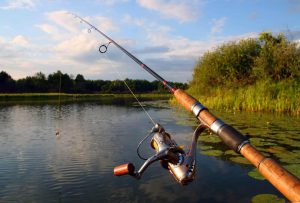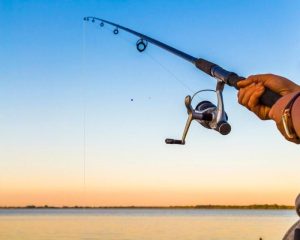Contents
DO FISHING RODS ATTRACT LIGHTNING
Fishing is a wonderful hobby enjoyed by many people worldwide. The locations that are usually chosen to fish are wide areas like lakes or the sea. But what happens when the weather takes a turn for the worse and it starts raining or even storming? There is a common question among anglers when fishing in bad weather: Do fishing rods attract lightning? The answer will be discovered in the following parts, which tell you whether fishing rods are made of conductive materials, how lightning works, and some tips to keep ourselves safe when fishing outdoors in thunderstorms.
What can attract lighting to fishing rods?
Fishing rods are essential tools for fishing and are made of various materials. Some of the common materials used to make fishing rods are non-conductive materials such as carbon fibers, fiberglass, and wood. These materials are chosen because they are both sturdy and lightweight, making them suitable for withstanding the pressure of catching fish. All of them are not conduct of electricity so fishing rods made of these materials are less likely to attract lightning. Even while fishing rods do not attract lightning, there is still the possibility of getting struck by lightning if you are fishing during a thunderstorm.

Are graphite fishing rods conductive?
Besides non-conductive materials, there are fishing rods made from graphite, a conductor of electricity. The sensitivity of graphite rods makes it easier to detect hits, and the rods’ stiffness produces stronger hook sets. However, many people are concerned about safety when using graphite fishing rods in stormy weather due to its electrical conductivity. I have to say that the conductivity of graphite rods is limited because of their construction. Therefore, fishing rods made of graphite are not an interesting object that lightning looking for.
In fact, regardless of the non-conductive or conductive materials of fishing rods, they are not targets of lightning. This is good news for anglers who are anxious about the conductivity of their fishing rods. So why does lightning have the ability to strike us, we will find out more in the following sections.
Lightning strikes a fishing rod is possible?
Exploring how lightning works can help you understand more the way lightning strikes a fishing rod. Lightning happens when there are lots of electric charges in the air. When the charge at the bottom gets strong enough, the cloud lets out energy by creating a lightning bolt to connect with something else, which could be the ground.
Can lightning strike a fishing rod? While it’s rare, lightning is likely to strike something tall and pointy like a fishing rod if it’s the easiest path to get to the ground, or the angler or pole was in the path of the lightning or provided the path of least resistance to the ground.
However, these cases are not very common. Lightning usually prefers the tallest and most conductive objects, like trees, buildings, or tall metal structures. These objects provide a more direct and efficient pathway for the electrical energy to reach the ground.

Is it good to fish during a storm?
It is crucial to note that fishing during a thunderstorm is dangerous and should be avoided. Because your body is a good conductor, lightning with 100 million volts may hit violently and cause massive physical harm or even death if you are in its path.
Being outside during a storm can make you target to lightning, either directly or indirectly. Lightning can strike around 10 miles from where it was sourced, including the water you’re fishing in. Water is a good conductor of electricity, so fishing near it can be extra dangerous. It’s best for you to stay away from fishing, water, and open areas when a storm comes.
In conclusion, going out for fishing on a stormy day is not a good idea. It will be better if you check the weather forecast before fishing, and make sure that the chosen day is suitable for fishing without any storms.
Safety tips for fishers during a thunderstorm
There are some unexpected weather conditions like when we are fishing and a storm comes with lightning, how should we respond? Remember that you must stop fishing during lightning. Here are some important tips that we hope will be helpful for you:
- Put the rod down: If you find yourself in a thunderstorm while fishing, stop fishing immediately and lay your fishing rod horizontally on the ground. This position will prevent the rod from acting as an antenna and attracting a lightning strike towards itself.
- Find a place of safety: Seek shelter in a low-lying area, or a nearby shelter if available. Do not seek shelter in open fields or elevated locations, as they can put you in a more dangerous situation.
- Avoid trees and metal: Trees and metal are the favorable objectives of lightning as I mentioned before, so you should not take shelter under a tree, or stand near or under metallic structures.
- Stay low in boats: If you are on a boat without a cabin when a storm is coming, position yourself as low as possible in the boat, such as by sitting in the center, and avoid touching any metal or wired electronics.
Fishing is a pastime, but your safety is the most important factor. Being prepared and understanding what to do in the upcoming storm will protect you from the danger of lightning strikes.
Conclusion
In the above sections, I answered the question presented at the beginning of the post: Do fishing rods attract lightning? Even if the answer is no, you are still at risk of being struck by lightning because lightning looks for the point with the easiest path to the ground. As a result, you and your fishing rods may become subject to lightning strikes. So fishing on stormy days is not a perfect choice. You can check the weather forecast to make sure it’s a bright, sunny, and clear day before enjoying fishing.
Hopefully, you will find this article helpful in providing information about lightning and how to protect yourself from the danger of lightning. If you enjoy it, share this post. We would be delighted.


